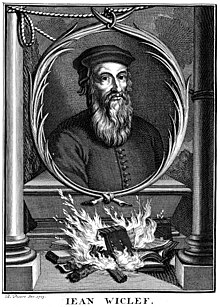Wycliffe and the burning of his books
This day in history: English scholastic philosopher, theologian, biblical translator, reformer and priest John Wycliffe died on this day in 1384. He became an influential dissident within the Roman Catholic priesthood during the 14th century and is considered an important predecessor to Protestantism. Wycliffe questioned the privileged status of the clergy which had bolstered their powerful role in England and the luxury and pomp of local parishes and their ceremonies.
Wycliffe is however best known for his Bible translation. "The first complete translation of the Bible into our language was made about the year 1380 by John de Wycliffe, or Wickliffe. There are several manuscript copies of it in the Bodleian and other European libraries. This great work unlocked the Scriptures to the multitude, or, as one of his antagonists, bewailing such an enterprise, worded it, 'the gospel pearl was cast abroad and trodden under foot.'" Source
The Church at the time did not like this development. Fines were handed out for anyone reading Wycliffe's Bible. Some of Wycliffe's supporters were burned at the stake.
Bible translations were also a threat to Church authorities as it made people question church doctrines:
"Wyclif's manuscript translations of the Bible had been widely circulated from about 1380 on, and it is said that some of his followers were tinged with Antitrinitarianism; but this Bible had to be read in secret, as did Tyndale's first printed New Testament of 1525, for fear of the law. In 1535, however, the English Bible began to be accessible to all, and many were reading it for the first time. First and last the influence of this book, when read in comparison with the creeds, has underlain all others leading men to reject the doctrine of the Trinity. Some of the most notable of the early English Unitarians declared they had never read nor heard the Unitarian doctrine, but had come to it solely through reading their Bibles."~Earl Morse Wilbur
The Council of Constance declared Wycliffe a heretic on 4 May 1415, and banned his writings, effectively excommunicating him retroactively. The Council decreed that Wycliffe's works should be burned and his bodily remains removed from consecrated ground. This order, confirmed by Pope Martin V, was carried out in 1428. Wycliffe's corpse was exhumed and burned and the ashes cast into the River Swift, which flows through Lutterworth.
See also Rare Olde English Bibles on DVDrom (Tyndale, Matthews, Coverdale, AV1611)



No comments:
Post a Comment